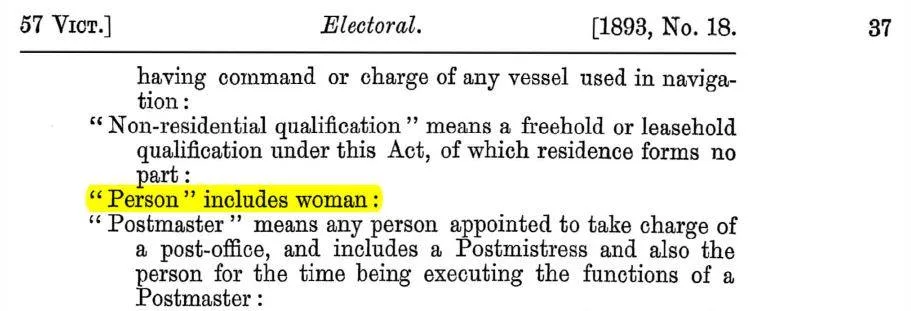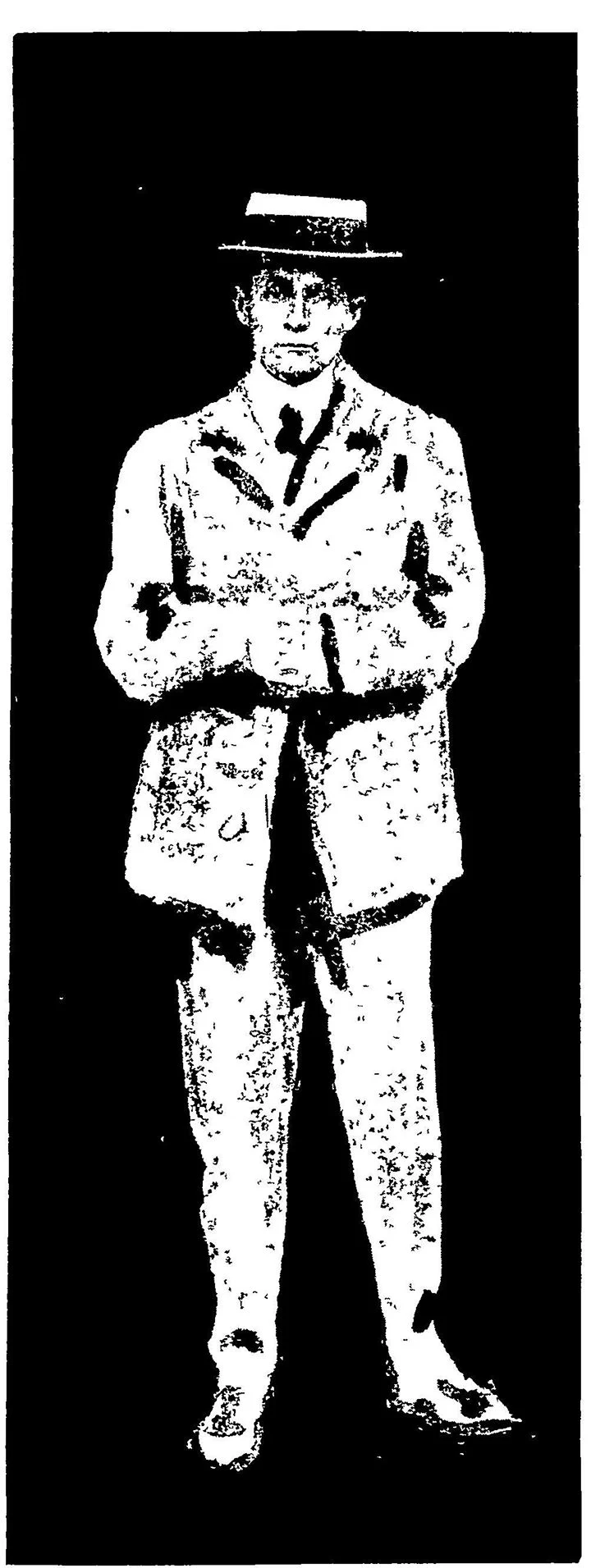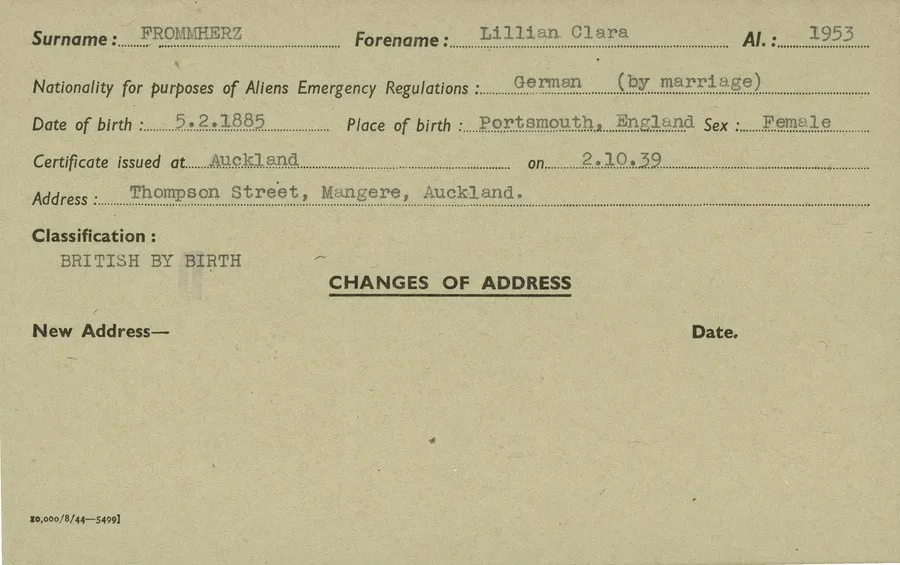The definition of a woman in 1893
The 1893 Women's Suffrage Petition states 'that large numbers of Women in the Colony have for several years petitioned Parliament to extend franchise to them'. But how did they define 'Women'? Who was included and excluded in this definition?
According to the subsequent 1893 Electoral Act women could now be included in the category of ‘person’[1].
Women could also be referred to by masculine pronouns although this had changed by 1927.
Although women were officially defined as ‘people’, there were restrictions. She had to be over 21 years of age, have lived in the ‘colony’ for at least one year prior and not a ‘lunatic’, convict or ‘alien’[2]. However, these last three restrictions were problematic. For while these restrictions still exist in some form or another in the current electoral act (and disproportionately affect Māori today in terms of the proportion of Māori in prisons compared to the rest of the population)[3], the laws and categorisations used for declaring someone a ‘lunatic’ or convicting them has differed greatly over the last 125 years. For example in the late 19th century and early 20th century there were cases of men and women being arrested under the vague Police Offences Act 1884[4][5], usually for vagrancy or disorderly behaviour, but often for wearing clothes ‘not of their sex’. Sometimes they were deemed to be committing fraud because they were ‘deceiving’ people by not dressing in the appropriate clothes such as Amy Bock who married a woman while ‘disguised’ as a man[6][7]. At the time it was not considered whether these people may have been transgender. So ‘universal suffrage’ may have still excluded a group of people.
The same year that women got the vote, the law for men convicted of ‘sodomy’ was made harsher with it being made illegal for men to have any sexual activity with each other and lashes and hard labour introduced as punishment[8]. As such, while 1893 was one step forward for some women, for some men it was a step backwards.
She also could not be an ‘alien’. Today you must be a permanent resident in order to vote[9]. However, until 1932 a woman’s nationality did not belong to her. Once she married she took on her husband’s nationality[10]. Later, some women were still listed under their husband’s passport application.
Chinese people could not naturalise between 1908 and 1951 which effectively excluded them from the chance to vote[11]. From 1881 they had to pay a poll tax to come to New Zealand which was out of reach for many people[12].
Until 1884 with the introduction of the Married Women’s Property Act[13] she was largely invisible in the eyes of the law. When she married, anything she might have owned also belonged to her husband. She could not own her own property. ‘Husband and wife were one financial and legal entity, controlled by the husband’[14].
In 1977 the introduction of the Human Rights Commission Act prevented discrimination based on her sex, but it wasn’t until 1993, 100 years after she got the vote, that this was extended to sexual orientation, pregnancy, marital status, and family[15][16].
And how do you define the women who signed the petition? Of the 32,000 people who signed the petition (although we only have the names of 25,000 of them as some sheets have been lost) at least 5 were known to be Māori[17], two Chinese[18], and several were men.
About 1668 of them were called Mary, 964 Jane, 750 Elizabeth (over 1000 including Eliza), 550 Margaret, and 400 Catherine/Katherine or Kate.
Some women were illiterate and signed with an x with their name recorded on their behalf. But there were also women who were university graduates and travelled the world. Unfortunately, it is very difficult to determine how many women would have been a part of what we now call the LGBQTI+ community. You would need to read between the lines as women who lived together, were very close or may have been in a same-sex relationship did not have the language to describe their relationship, were not acknowledged, or were dismissed as just being ‘friends’ or ‘pals’.
So what did ‘women’ mean in 1893? Legally it meant over 21, not a criminal, ‘lunatic’ or ‘alien’. She had at least a 1 in 15 chance of being called Mary or 1 in 25 chance of being called Jane. She probably had several children. Although the 1893 Electoral Act was purported to be ‘universal suffrage’, in reality, it was not. The law still unfairly discriminated against some groups of people. However, the private lives of these women still remains largely that so it is difficult to give a truly accurate definition of ‘women’ in 1893. Though we are still uncovering many stories, there are thousands left to discover.
Members of the public can help by submitting biographies of these women by emailing the Ministry of Culture and Heritage or submitting your biography as a community contribution on their individual petition page at NZHistory.
-
References
[1] Electoral Act 1893 (57 VICT 1893 No 18), http://www.nzlii.org/nz/legis/hist_act/ea189357v1893n18180/
[2] Electoral Act 1893 (57 VICT 1893 No 18), http://www.nzlii.org/nz/legis/hist_act/ea189357v1893n18180/
[3] New Zealand’s Prison Population, http://archive.stats.govt.nz/browse_for_stats/snapshots-of-nz/yearbook/society/crime/corrections.aspx
[4] Police Offences Act 1884 (48 VICT 1884 No 24) http://www.nzlii.org/nz/legis/hist_act/poa188448v1884n24217/
[5] https://paperspast.natlib.govt.nz/newspapers/WAG19080829.2.29 MASQUERADING AS A WOMAN., Wairarapa Age, Volume XXXI, Issue 9178, 29 August 1908
[6] AMY BOCK IN MALE ATTIRE OTAGO WITNESS, ISSUE 2877, 5 MAY 1909 https://paperspast.natlib.govt.nz/newspapers/otago-witness/1909/5/5/47
[7] https://paperspast.natlib.govt.nz/newspapers/HBH18930425.2.15 WOMEN IN MEN'S CLOTHES., Hawke's Bay Herald, Volume XXVIII, Issue 9354, 25 April 1893
[8] Criminal Code Act 1893 (57 VICT 1893 No 56) http://www.nzlii.org/nz/legis/hist_act/cca189357v1893n56192/
[9] Electoral Act 1993 http://www.legislation.govt.nz/act/public/1993/0087/latest/DLM308824.html
[10] Anne Else, 'Gender inequalities - Politics and citizenship', Te Ara - the Encyclopedia of New Zealand, http://www.TeAra.govt.nz/en/photograph/28631/losing-your-nationality (accessed 8 June 2018)
[11] David Green, 'Citizenship - 1840–1948: British subjects', Te Ara - the Encyclopedia of New Zealand, http://www.TeAra.govt.nz/en/citizenship/page-1 (accessed 7 March 2019)
[12] 'Poll tax imposed on Chinese', URL: https://nzhistory.govt.nz/poll-tax-imposed-on-chinese, (Ministry for Culture and Heritage), updated 26-Feb-2019
[13] Married Women's Property Act 1884 (48 VICT 1884 No 10), http://www.nzlii.org/nz/legis/hist_act/mwpa188448v1884n10367/
[14] Anne Else, 'Gender inequalities - Sexuality', Te Ara - the Encyclopedia of New Zealand, http://www.TeAra.govt.nz/en/zoomify/28628/christchurch-lock-hospital (accessed 8 June 2018)
[15] Anne Else, 'Gender inequalities - Sexuality', Te Ara - the Encyclopedia of New Zealand, http://www.TeAra.govt.nz/en/zoomify/28628/christchurch-lock-hospital (accessed 8 June 2018)
[16] Human Rights Act 1993, http://www.legislation.govt.nz/act/public/1993/0082/latest/DLM304212.html
[17] He Tohu Rangatira https://www.facebook.com/notes/archives-new-zealand/he-tohu-rangatira-m%C4%81ori-women-the-1893-suffrage-petition/1790791837650758/




